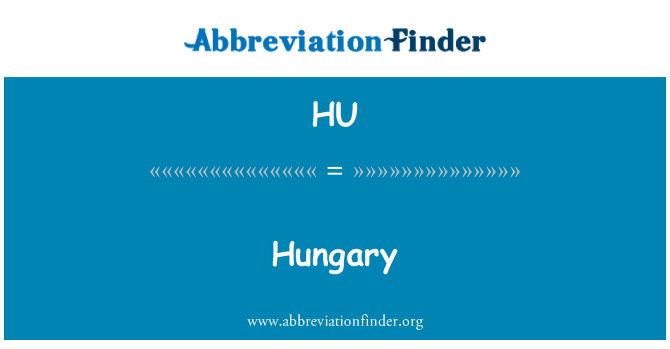HU is the abbreviation for Hungary, the 108th largest country in the world. Hungary is a country located in Europe, bordering 7 countries – Austria, Croatia, Romania, Serbia, Slovakia, Slovenia, and Ukraine. Budapest is the capital city of Hungary. Top 10 biggest cities are Budapest (population: 1,741,030), Debrecen (population: 204,113), Miskolc (population: 172,626), Szeged (population: 164,872), Pécs (population: 156,638), Győr (population: 128,254), Nyíregyháza (population: 116,287), Kecskemét (population: 109,836), Székesfehérvár (population: 101,589), and Szombathely (population: 79,523).
Country Profile
- Capital: Budapest
- Language: Hungarian
- Area: 93,030 km2
- Population: 9,772,745
- Currency: Forint (HUF)
- Time zone: UTC+1
- Calling code: 36
- ISO 2-Letter Abbreviation: HU
- UN 3-Letter Abbreviation: HUN
- Internet TLD: .hu
- State Government Website: http://kormany.hu
List of Hungary Acronyms
The most commonly used abbreviations about Hungary are HU which stands for Hungary and HUF which means Forint (Hungary currency). In the following table, you can see all acronyms related to Hungary, including abbreviations for airport, city, school, port, government, and etc.

Geography
Hungary is a country in the middle of Central Europe characterized by lowlands and plains. Only two percent of the land area reaches over 400 meters. The land is divided into two of the Danube river that runs from north to south. East of the Danube lies a large plain of fertile soil, and west of the Danube there are ridge landscapes. Here is also the largest lake in Central Europe, Lake Balaton. Hungary is at the intersection of three different climate zones. This causes very unstable and varying weather. The country usually has cold winters and hot summers, but this also varies from year to year.
The biggest climate challenges in Hungary are air, water and soil pollution due to poor waste management. The country does not currently meet EU requirements for environmental management of man-made waste.
History
Hungary’s history is marked by its central location in Europe. For thousands of years, humans have stayed in the steppe country around the Danube river banks. The area was occupied by the Roman Empire in 12 BCE. and over the next thousand years the area was invaded and occupied a number of times by different peoples, cultures and kingdoms. In the 9th century, the nomadic group of Madjeans settled on the steppes along the banks of the Danube, forming the origin of today’s Hungary.
In the year 1001, the country’s first king was crowned, and on that occasion declared the country as independent. Until 1526, when the Ottoman Empire invaded, Hungary was an independent empire with great influence in Europe from time to time. The Ottomans ruled for almost 400 years until Austria took power in 1699. Hungary remained in union with Austria until 1918, when the country again became an independent state. During World War II, the country supported Nazi Germany, and was then pushed into a communist regime controlled by the Soviet Union after the war and until 1989. Then Hungary became the first country to liberate itself from the Soviet Union, and introduced free democratic elections. The country joined NATO in 1999 and the EU in 2004.
Society and politics
Hungary is a parliamentary democracy. Parliament is the legislative power, while the government is the executive. The government is based on parliament and is governed by a prime minister. The president, who is elected by parliament for five years at a time, mainly has a ceremonial role.
Since the 2010 election, when national conservative politicians came to power, Hungary’s policy has been heavily criticized. Politicians’ legislative amendments and bills have challenged democracy and put pressure on established guidelines within the EU. Among other things, the country set up border posts against Slovenia and Croatia to control the flow of refugees into the country, undermining the principle of border freedom in the EU and the Schengen area. In 2012, the government also decided to amend the country’s constitution. The amendment is criticized for undermining the balance between the legislative, the executive and the judiciary in democracy by restricting the independence of the country’s courts.
Hungary has an underdeveloped health sector compared to the EU average. Health care has major shortcomings, and access to healthcare varies widely between the regions. The country is also heavily criticized for violating the human rights of asylum seekers, refugees and minorities.
Economics and Commerce
In the 1990s, Hungary underwent a rapid change from planning economy to market economy. The authorities transferred state enterprises to the private sector and paid down the national debt. The reforms led to strong economic growth and a rapid improvement in living standards.
Traditionally, Hungary’s economy has been based on agriculture. After the country joined the EU, industry and service industries have been developed, and today form the basis for most of the country’s gross domestic product. The country has, among other things, invested in car production, renewable energy, tourism and information technology.
The global financial crisis in 2008 hit Hungary hard. The country had to raise large loans from the European Central Bank, the International Monetary Fund and the World Bank to avoid economic collapse. The loans gained momentum again, but the government did not follow the advice of the International Monetary Fund. This went well beyond the people, who noticed little about the country’s economic progress. Today, around 14 percent of the population lives below the national poverty line.
View this article in other languages:
Deutsch – Français – 繁體中文


